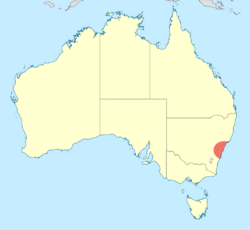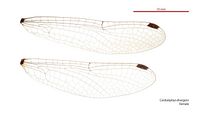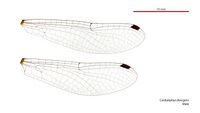Biology:Cordulephya divergens
From HandWiki
Short description: Species of dragonfly
| Clubbed shutwing | |
|---|---|
| Scientific classification | |
| Domain: | Eukaryota |
| Kingdom: | Animalia |
| Phylum: | Arthropoda |
| Class: | Insecta |
| Order: | Odonata |
| Infraorder: | Anisoptera |
| Family: | Cordulephyidae |
| Genus: | Cordulephya |
| Species: | C. divergens
|
| Binomial name | |
| Cordulephya divergens | |

| |
Cordulephya divergens is a species of dragonfly of the family Cordulephyidae,[3] commonly known as the clubbed shutwing.[4] It inhabits streams in the Sydney Basin, Australia.[5][6]
Cordulephya divergens is a small to tiny, black or purplish-black dragonfly with yellowish markings. It rests with its wings folded above its body in a similar manner to a damselfly.[4]
Gallery
See also
- List of Odonata species of Australia
References
| Wikimedia Commons has media related to Cordulephya divergens. |
- ↑ Dow, R.A. (2017). "Cordulephya divergens". IUCN Red List of Threatened Species 2017: e.T14272602A59256573. doi:10.2305/IUCN.UK.2017-1.RLTS.T14272602A59256573.en. https://www.iucnredlist.org/species/14272602/59256573. Retrieved 20 November 2021.
- ↑ Tillyard, R.J. (1917). "On some new dragonflies from Australia and Tasmania (Order Odonata)". Proceedings of the Linnean Society of New South Wales 42: 450–479 [467]. doi:10.5962/bhl.part.4860. https://www.biodiversitylibrary.org/page/6372406.
- ↑ "Species Cordulephya divergens Tillyard, 1917". Australian Biological Resources Study. 2012. https://biodiversity.org.au/afd/taxa/Cordulephya_divergens.
- ↑ 4.0 4.1 Theischinger, Günther; Hawking, John (2006). The Complete Field Guide to Dragonflies of Australia. Collingwood, Victoria, Australia: CSIRO Publishing. pp. 238. ISBN 978-0-64309-073-6.
- ↑ Theischinger, Gunther; Endersby, Ian (2009). Identification Guide to the Australian Odonata. Department of Environment, Climate Change and Water NSW. pp. 209. ISBN 978-1-74232-475-3.
- ↑ Watson, J.A.L.; Theischinger, G.; Abbey, H.M. (1991). The Australian Dragonflies: A Guide to the Identification, Distributions and Habitats of Australian Odonata. Melbourne: CSIRO. pp. 278. ISBN 0643051368.
Wikidata ☰ Q2137862 entry
 |




